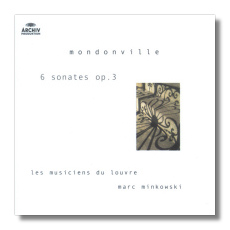
The Internet's Premier Classical Music Source
Related Links
- Mondonville Reviews
- Latest Reviews
- More Reviews
-
By Composer
-
Collections
DVD & Blu-ray
Books
Concert Reviews
Articles/Interviews
Software
Audio
Search Amazon
Recommended Links
Site News
 CD Review
CD Review
Jean-Joseph Cassanéa de Mondonville

Six Sonates en symphonie, Op. 3 (1734)
- Sonata in G minor, Op. 3 #1
- Sonata in F Major, Op. 3 #2
- Sonata in B Flat Major, Op. 3 #3
- Sonata in C Major, Op. 3 #4
- Sonata in G Major, Op. 3 #5
- Sonata in A Major, Op. 3 #6
Les Musiciens de Louvre (Grenoble)/Marc Minkowski
Archiv 474550-2 DDD 57:50
Although he is not well remembered today, Jean-Joseph Cassanéa de Mondonville (1711-1772) was a prominent composer in Paris and at Versailles, where he eventually was appointed "Violon de la Chambre et la Chapelle du Roi" and intendant of the royal chapel. He played the violin, conducted, and composed, all with equal facility, it is believed.
Today we can judge only the last of these three talents, of course. The six "sonatas" presented here are as enjoyable as any work to come from the French Baroque period. Originally, Mondonville wrote this music to be played by harpsichord with violin accompaniment – that is to say, the music could be played without the violin part, if circumstances dictated. Then, fifteen years later, the composer rewrote the sonatas for string ensemble, plus oboe, bassoon, and keyboard. Although labeled as "symphonic sonatas," these concertante-style works now provided solo opportunities for strings.
Mondonville took the side of French opera in the "Querelle des Bouffons," the rivalry between French and Italian operas that amused and divided Parisians in the early 1750s. Ironically, the six symphonic sonatas owe as much to the Italians as to the French. Each is in three movements. There is an Allegro "Overtura" (the first has a slow introduction), a flowing "Aria," and a closing "Gigha" – not necessarily in triple time. The music is not at all complicated. It seems to have been written with sensual pleasure in mind, not intellectual stimulation.
Minkowski's ensemble is a large one. Among the strings, there are twelve violins, two violas, four cellos, and two double basses. There are two oboes and two bassoons, as well. In four of the sonatas, Minkowski uses a harpsichord; for contrast, an organ is used in the other two. The pitch is a'=415 Hz. There's nothing astringent or sober about the musicianship. This is a high-spirited, well-conceived look at a composer who does not deserve total oblivion.
Originally released just a few years ago at full price, this CD has been reissued as part of Deutsche Grammophon Archiv's mid-priced "Blue" series. The engineering is splendid. My only complaint is that the booklet note fawns over Minkowski (wonderful as his conducting is) at the expense of telling us more about Mondonville.
Copyright © 2004, Raymond Tuttle




















